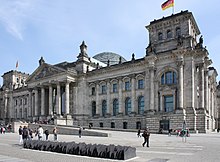Willi Skamira
Willi Skamira (born March 7, 1897 in Landsberg an der Warthe , † January 22, 1945 in the Brandenburg-Görden prison , Brandenburg an der Havel ) was a German politician (KPD).
Live and act
Skamira was born in 1897 as the son of a woodworker. After attending primary school , Skamira completed an apprenticeship as a carpenter. During the First World War he was used as an infantryman and pioneer on the Western Front.
After the war ended, Skamira lived as a trader in Egloffstein . During the Weimar period, Skamira initially belonged to the Social Democratic Party of Germany (SPD). In 1928 he switched to the Communist Party of Germany (KPD). In the KPD, Skamira devoted himself particularly to political work in the countryside, especially in the Neumark . In 1931, for example, in numerous meetings in rural areas, he explained the KPD's 1931 peasant aid program.
In July 1932 Skamira was elected as his party's candidate for constituency 3 (Potsdam II) in the Reichstag , to which he belonged until the November elections of the same year.
After the " seizure of power " by the National Socialists, Skamira was arrested in March 1933 and held in the Sonnenburg concentration camp from early summer until March 1934 . In the spring of 1944 Skamira came into contact again with the communist underground movement in Germany, which approached him at that time. In August 1944 he was arrested again.
On December 15, 1944, Skamira was sentenced to death by the People's Court for preparing for high treason , favoring the enemy, and undermining military strength . After a submitted by him for clemency had been rejected, Skamira was on 22 January at the Brandenburg prison with the guillotine executed. On January 26th, the senior Reich attorney informed Skamira's widow that the death sentence was being carried out and prohibited the publication of an obituary notice.
Commemoration
After the end of National Socialist rule, Skamira's urn was finally buried in the Kalkberg cemetery in September 1945. The memorial stone there, which reminds him of him, bears a German as well as a French inscription, which is probably due to Skamira's friendship with French prisoners in prison. Since 1992 one of the 96 memorial plaques for members of the Reichstag murdered by the National Socialists in Berlin has been commemorating Skamira near the Reichstag .
literature
- Skamira, Willi . In: Hermann Weber , Andreas Herbst : German Communists. Biographisches Handbuch 1918 to 1945. 2nd, revised and greatly expanded edition. Dietz, Berlin 2008, ISBN 978-3-320-02130-6 .
Web links
- Willi Skamira in the database of members of the Reichstag
Individual evidence
- ↑ According to Skamira's information in the pardon of December 16, 1944, quoted by Martin Schumacher (Ed.): MdR Die Reichstag members of the Weimar Republic in the time of National Socialism. Political persecution, emigration and expatriation 1933-1945. Droste-Verlag, Düsseldorf 1991, ISBN 3-7700-5162-9 , p. 545.
- ↑ Schumacher, MdR , p. 545.
| personal data | |
|---|---|
| SURNAME | Skamira, Willi |
| BRIEF DESCRIPTION | German politician (KPD), MdR |
| DATE OF BIRTH | March 7, 1897 |
| PLACE OF BIRTH | Landsberg on the Warta |
| DATE OF DEATH | January 22, 1945 |
| Place of death | Brandenburg-Görden prison , Brandenburg an der Havel |
